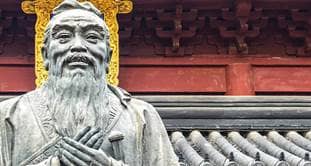- Trending:
- Pope Leo Xiv
- |
- Israel
- |
- Trump
- |
- Social Justice
- |
- Peace
- |
- Love
Patheos Featured Writers
Works by Jeffrey Richey
Worship and Devotion in Daily Life
Jeffrey Richey | June 19, 2017
To live one's life as the best person one can be, to constantly strive to cultivate......
Gender and Sexuality
Jeffrey Richey | June 19, 2017
Women were expected to demonstrate exemplary behavior and uncomplaining obedience.......
Vision for Society
Jeffrey Richey | June 19, 2017
Confucius envisioned a society in which all lived in harmony, content with their place......
Symbolism
Jeffrey Richey | June 19, 2017
Symbols specific to Confucianism are relatively rare, and almost always pertain to......
Principles of Moral Thought and Action
Jeffrey Richey | June 19, 2017
Confucius provided few specific moral principles. One should obey one's elders and......
Community Organization
Jeffrey Richey | June 19, 2017
In traditional China, Confucianism prevailed within the courts of the nobility and in......
Leadership
Jeffrey Richey | June 19, 2017
The model Confucian leader was the scholar-official. Years of education in the classic......
Sacred Space
Jeffrey Richey | June 19, 2017
Confucius stated that divine realms are beyond human comprehension, so there is no......
Sacred Time
Jeffrey Richey | June 19, 2017
As Confucius stated that ultimate reality is beyond human comprehension, there is no......
Sacred Narratives
Jeffrey Richey | June 19, 2017
The idea of learning from the past is fundamental to Confucian thinking, and the early......
Afterlife and Salvation
Jeffrey Richey | June 19, 2017
Confucius stated that the afterlife was beyond human comprehension. Humans should live......
Ultimate Reality and Divine Beings
Jeffrey Richey | June 19, 2017
Confucius did not deny the existence of a reality beyond the human world, but he said......
Modern Age
Jeffrey Richey | June 19, 2017
Confucianism has been both lauded and condemned in the modern age. Confucianism, along......
Rites and Ceremonies
Jeffrey Richey | June 19, 2017
Despite his disinterest in ultimate questions, Confucius was a strong advocate for......
Exploration and Conquest
Jeffrey Richey | June 19, 2017
Han Feizi's philosophy was of profound importance to the Qin emperor who first unified......
Human Nature and the Purpose of Existence
Jeffrey Richey | June 19, 2017
Confucian scholars have long debated essential human nature without reaching agreement......
Schisms and Sects
Jeffrey Richey | June 19, 2017
While there were differing interpretations of Confucianism and disagreements about its......
Missions and Expansion
Jeffrey Richey | June 19, 2017
There were few regional differences in Confucianism, but specific interpretations......
Suffering and the Problem of Evil
Jeffrey Richey | June 19, 2017
According to some interpretations of Confucianism, suffering and evil are inevitable in......
Early Developments
Jeffrey Richey | June 19, 2017
Confucianism as an institution was not established until long after the death of its......
Influences
Jeffrey Richey | June 19, 2017
Confucius attributed his teachings to the Duke of Zhou, a heroic figure from his home......
Historical Perspectives
Jeffrey Richey | June 19, 2017
Some Western scholars have argued that "Confucianism" was manufactured or invented by......
Beginnings
Jeffrey Richey | June 19, 2017
Confucius's ideas became well known only after his death. The 4th-century B.C.E.......
Founders
Jeffrey Richey | June 19, 2017
Confucius, whose Chinese name was Kong Qiu (K'ung Ch'iu), was born around 552 B.C.E. and......
Sacred Texts
Jeffrey Richey | June 19, 2017
Confucius left no writings, although the "Five Classics" of Chinese literature are......
Confucianism
Jeffrey Richey | June 19, 2017
Confucianism, though commonly labeled a religion, could more accurately be understood as......
Disaster in Japan
Jeffrey Richey | March 28, 2011
When monstrosity strikes, the character of a culture is revealed....




